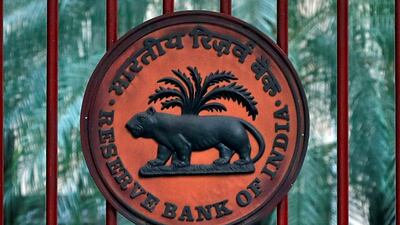Tensions between the Reserve Bank of India and the country's government may have eased after a board meeting, but the standoff is deep-rooted and is worrying investors in Asia’s third-largest economy, according to analysts.
The relatively tame outcome of the meeting helped the Indian rupee, Asia’s worst performing currency this year, to rally for a sixth day, its longest gain in more than a year.
The RBI and the government in recent weeks have been locked in a public dispute, over issues including allotment of reserves to New Delhi and the regulation of the banking sector, and more significantly, the independence of the central bank.
“The overall mess which has happened is a matter of concern,” said Sujan Hajra, a former RBI director and the chief economist at Anand Rathi, a financial services company based in Mumbai. “We don't think there's any clarity from either side on a lot of these complex issues.”
The RBI board held a day-long meeting on Monday in Mumbai against the tense backdrop. The 18-member board includes government officials, central bank officials and independent directors appointed by the government. There were concerns that this meeting could lead to an escalation of the row.
There were even some speculations in the run-up to the board meeting that it could result in the resignation of RBI governor Urjit Patel. But the eventual outcome of the gathering was much more subdued.
The nine-hour long meeting resulted in an agreement that the RBI would form a committee to examine the economic capital framework, which could ultimately determine how much money the central bank can transfer to the government.
___________
Read more:
Indian government and central bank fighting is bad for business
India's central banks warns government on independence
___________
“The independence of the central bank remains a matter of grave concern,” said Mahesh Singhi, the founder and managing director of Singhi Advisors, a global investment banking firm based in Mumbai. “Financial markets, particularly bond and currency markets, have traditionally displayed a severe aversion to political meddling in the affairs of central banks. Sustained political interference gives rise to politically-motivated decisions, posing serious risks to creditors of sovereign governments.”
The RBI in a statement said the board also discussed a restructure plan for stressed small- and medium-sized businesses and a group of debt-laden state-owned banks that have been placed under a scheme to restrict their lending.
Prime minister Narendra Modi's government is eager to secure more cash from the central bank to be able to spend ahead of a general election due in May next year. The government also wants ease in lending to boost the economy ahead of the election.
Analysts at Nomura in a research note said the RBI and government had "walked away from the cliff-edge".
"Overall, the outcome of the board meeting suggests that a direct confrontation has been avoided and the more contentious issues have been deferred to committees," Nomura said. "The decisions suggest efforts have been made to preserve the RBI's operational autonomy."
Nothing that there were no resignations should provide “a near-term respite”, according the Japanese lender said.
It is common for governments and central banks world over not to see eye-to-eye, particularly when it comes to interest rates. But the fact that the disagreement between the RBI and the government was public alarmed investors.
“This obviously impacts investor sentiments, particularly foreign investor sentiment, who have a choice of where to invest and between investing in India or investing elsewhere in the world,” said Mr Hajra.
The discord cropped up last month when the RBI's deputy governor Viral Acharya in a lecture in Mumbai brought up the issue of government interference. India's Finance Minister Arun Jaitley then retorted, blaming the RBI for its role in not preventing the country's banks from amassing tens of billions of dollars of bad debt.

